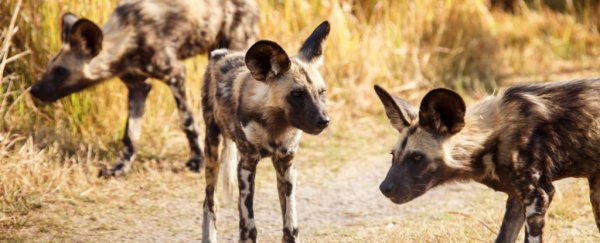Do pack animals just follow their leader? Or if not, how do they reach a consensus? According to observations taken of African wild dogs in Botswana, one option is sneezing.
According to new research, if enough animals in the pack sternutate, that constitutes a quorum that it's time to get up and go hunting.
The research was initiated by Neil Jordan of the UNSW Centre for Ecosystem Science, who was studying the dogs' social rallies. This is when the dogs, when they have finished resting, conduct energetic greeting ceremonies before running off to hunt.
Jordan started to notice that, prior to these rallies, the dogs would sneeze a lot more than usual.
"I wanted to better understand this collective behaviour, and noticed the dogs were sneezing while preparing to go," he said.
"We recorded details of 68 social rallies from 5 African wild dog packs living in the Okavango Delta in Botswana, and couldn't quite believe it when our analyses confirmed our suspicions."
Previously, researchers had thought the dogs were sneezing just to clear their airways. But the amount of sneezing, and the dogs involved in the sneezing, indicates that it has a more deliberate purpose.
"The more sneezes that occurred, the more likely it was that the pack moved off and started hunting. The sneeze acts like a type of voting system," says Jordan.
The research team found that if the dominant dogs sneezed, then only a few sneezes were required for the rally to take place. If the dominant dogs did not sneeze, then the rally would only take place after 10 or more sneezes.
However, this also demonstrated that the pack leaders could be overridden, if enough of the pack wanted it.
"The sneezes act as a type of quorum, and the sneezes have to reach a certain threshold before the group changes activity," says one of the team, researcher Andrew King of Swansea University.

The study notes that the sneezes are similar to signals used by other canid species as threats or alarms. However, unlike those species, the dogs sneezing were physically relaxed, and the other dogs did not respond to the sneezes with startlement or anxiety.
Quorum behaviour, in which a minimum number of votes is required before the group of animals decides to move on, has also been observed in meerkats, honeybees, mountain gorillas and white-faced capuchin monkeys.
The study was also careful to note that at this time, it is not known if the sneezes are a true voting mechanism or a physical confirmation of a decision already reached by unknown means.
"Physiologically, the rapid exhalation may function to prepare the pack to hunt by clearing the nasal cavity to make scenting and running easier, but this does not preclude that sneezing may also be a true voting mechanism," the researchers write in the study.
"Further research is required to confirm causality."
The research is published in the journal Proceedings of the Royal Society B.
UNSW Science is a sponsor of ScienceAlert. Find out more about their world-leading research.
